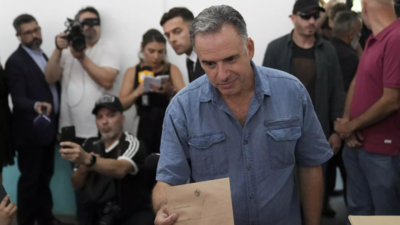
MONTEVIDEO: Left-wing politician Yamandu Orsi was elected president of Uruguay, official results showed on Sunday, in a rebuke by voters of five years of conservative rule.
Uruguayans went to the polls for the second round of voting in what became a tight race between Orsi, of the Frente Amplio (Broad Front) alliance, and Alvaro Delgado of the National Party, a member of outgoing President Luis Lacalle Pou’s center-right Republican Coalition.
Orsi promised in a victory speech on Sunday evening to be a president “who calls again and again for national dialogue to find the best solutions.”
Delgado meanwhile conceded defeat, saying he was sending “a big hug and a greeting to Yamandu Orsi.”
Though the election will shift the balance of power in Uruguay, analysts did not foresee a massive change in the country’s economic direction, with Orsi having previously promised “change that will not be radical.”
Both candidates pledged to fight crime linked to drug trafficking and to boost economic growth, which is recovering from the slowdown brought by the Covid-19 pandemic and a historic drought.
With 94.4 percent of ballots counted, Orsi won 1,123,420 votes compared to Delgado’s 1,042,001, the country’s Electoral Court said.
Cheers broke out in the capital Montevideo, a bastion of Frente Amplio support, when projections showing Orsi leading were announced.
His campaign was boosted by support from Jose “Pepe” Mujica, a former guerrilla lionized as “the world’s poorest president” because of his modest lifestyle during his 2010-2015 time in office.
Orsi, seen as an understudy of Mujica, had garnered 43.9 percent of the October 27 first-round vote — short of the 50 percent needed to avoid a runoff but ahead of the 26.7 percent of ballots cast for Delgado.
The pair came out on top of a crowded field of 11 candidates seeking to replace Lacalle Pou, who has a high approval rating but is barred constitutionally from seeking a second consecutive term.
Following October legislative elections, Orsi will govern with a majority in the Senate, though the Frente Amplio is in the minority in the Chamber of Representatives.
‘A very different world’
The victory for Orsi will see Uruguay swing left again after five years of center-right rule in the country of 3.4 million inhabitants.
In 2005, the Frente Amplio coalition broke a decades-long conservative stranglehold with an election victory and held the presidency for three straight terms.
It was voted out in 2020 on the back of concerns about rising crime blamed on high taxes and a surge in cocaine trafficking through the port of Montevideo.
Polling numbers ahead of the vote showed perceived insecurity remains Uruguayans’ top concern five years later.
A 72-year-old retiree who voted, Juan Antonio Stivan, said he just wanted the next government to guarantee “safety — to be able to go out in the street with peace of mind, as an old person, as a young person, as a child.”
Another voter, Aldo Soroara, a 60-year-old winegrower, said he expected whoever is elected as president to do “the best he can for the people,” adding: “You can’t ask for much more in these difficult times.”
Voting is compulsory in Uruguay, one of Latin America’s most stable democracies, with comparatively high per-capita income and low poverty levels.
During the heyday of leftist rule, Uruguay legalized abortion and same-sex marriage, became the first Latin American country to ban smoking in public places and the world’s first nation, in 2013, to allow recreational cannabis use.
Former president Mujica, who is battling cancer and had to use a cane to walk into his polling station to vote, said Sunday: “Personally, I have nothing more to look forward to. My closest future is the cemetery, for reasons of age.
“But I am interested in the fate of you, the young people who, when they are my age, will live in a very different world.”






